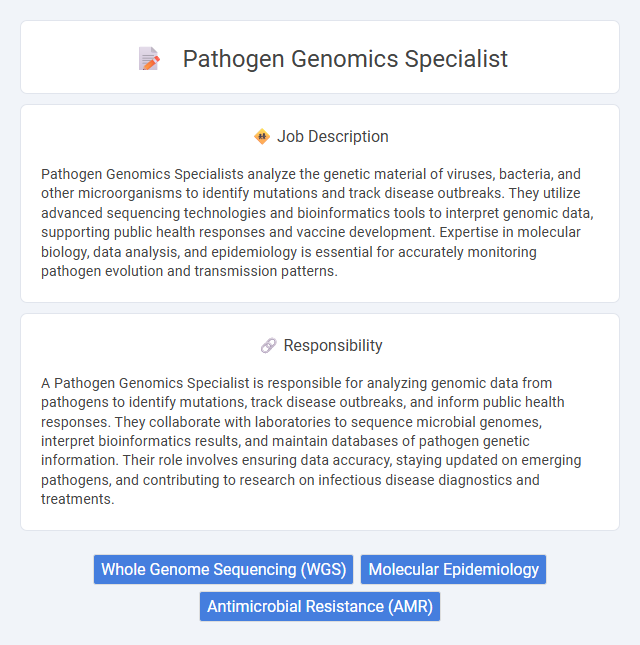
Pathogen Genomics Specialists analyze the genetic material of viruses, bacteria, and other microorganisms to identify mutations and track disease outbreaks. They utilize advanced sequencing technologies and bioinformatics tools to interpret genomic data, supporting public health responses and vaccine development. Expertise in molecular biology, data analysis, and epidemiology is essential for accurately monitoring pathogen evolution and transmission patterns.
Individuals with a strong background in biology, genetics, or microbiology are more likely to excel as Pathogen Genomics Specialists, given the technical demands of analyzing complex genomic data. Those who possess attention to detail, critical thinking skills, and an aptitude for working with advanced laboratory tools may be well-suited for this role. Candidates with a passion for research and a willingness to engage in continuous learning will probably find this career both challenging and rewarding.
Qualification
A Pathogen Genomics Specialist typically holds a master's or doctoral degree in molecular biology, genomics, microbiology, or a related field, with extensive experience in next-generation sequencing (NGS) technologies and bioinformatics. Proficiency in data analysis software such as Python, R, or specialized pathogen genomics tools is essential for interpreting genomic data and identifying mutations or resistance markers. Strong knowledge of infectious disease epidemiology, molecular diagnostics, and laboratory best practices ensures accurate detection and monitoring of pathogens in clinical or research settings.
Responsibility
A Pathogen Genomics Specialist is responsible for analyzing genomic data from pathogens to identify mutations, track disease outbreaks, and inform public health responses. They collaborate with laboratories to sequence microbial genomes, interpret bioinformatics results, and maintain databases of pathogen genetic information. Their role involves ensuring data accuracy, staying updated on emerging pathogens, and contributing to research on infectious disease diagnostics and treatments.
Benefit
Pathogen Genomics Specialists may benefit from opportunities to advance public health by identifying and tracking infectious disease outbreaks through genetic analysis. Their expertise likely supports the development of targeted treatments and vaccines, enhancing patient outcomes. Access to cutting-edge technology and interdisciplinary collaboration could further increase job satisfaction and professional growth.
Challenge
Pathogen Genomics Specialists likely face the challenge of rapidly analyzing complex genetic data to identify and track emerging infectious diseases. The role probably demands staying current with evolving sequencing technologies and bioinformatics tools to ensure accurate pathogen detection. Managing high-pressure situations where timely genomic insights influence public health responses may frequently test their problem-solving abilities.
Career Advancement
A career as a Pathogen Genomics Specialist offers significant advancement through expertise in high-throughput sequencing technologies, bioinformatics analysis, and infectious disease research. Specialists can progress to leadership roles in public health laboratories, biotech companies, or academic research institutions, influencing outbreak management and vaccine development. Mastery of pathogen genome data interpretation and integration with epidemiological information enhances opportunities for impact and professional growth.
Key Terms
Whole Genome Sequencing (WGS)
Pathogen Genomics Specialists utilize Whole Genome Sequencing (WGS) to analyze and interpret the complete DNA sequences of pathogens, enabling precise identification, tracking, and characterization of infectious agents. Expertise in bioinformatics tools and sequencing technologies is critical for generating high-quality genomic data that support outbreak investigations, antimicrobial resistance monitoring, and vaccine development. This role demands proficiency in genomic data management, variant analysis, and collaboration with public health laboratories to inform disease control strategies.
Molecular Epidemiology
Pathogen Genomics Specialists leverage advanced molecular epidemiology techniques to analyze genetic variations in pathogens, enabling precise tracking of disease transmission and outbreak sources. Proficiency in next-generation sequencing (NGS) and bioinformatics tools supports the identification of mutations that impact pathogen virulence and resistance. Expertise in integrating genomic data with epidemiological patterns enhances public health responses and informs targeted intervention strategies.
Antimicrobial Resistance (AMR)
Pathogen Genomics Specialists analyze genomic data to identify and track antimicrobial resistance (AMR) genes, enhancing the understanding of resistant pathogens and informing treatment strategies. They utilize advanced sequencing technologies and bioinformatics tools to monitor AMR trends, contributing to public health surveillance and outbreak response. Their expertise supports the development of targeted interventions to combat the spread of multidrug-resistant infections.
 kuljobs.com
kuljobs.com